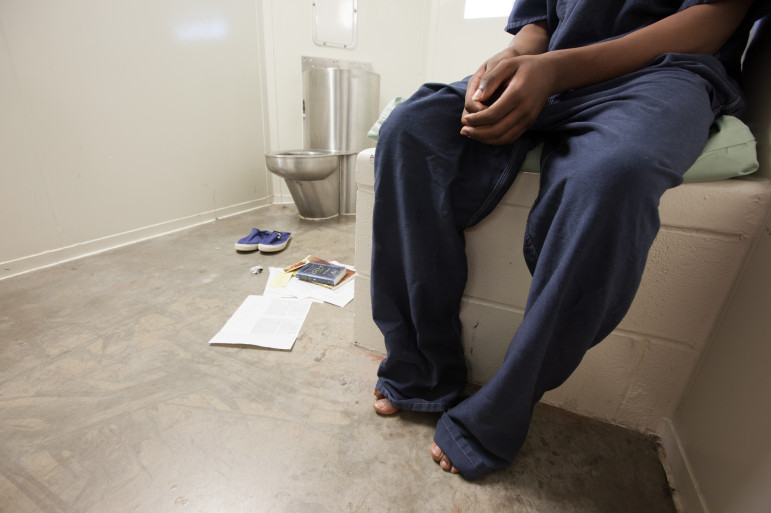
Amid growing outcry over solitary confinement of juveniles, the Baltimore-based Annie E. Casey Foundation is calling for an end to the practice except as a short-term response to behavior that threatens a youth or others.
Newly revised juvenile detention facility standards — to be released this week in Philadelphia at an annual conference of Casey’s groundbreaking Juvenile Detention Alternatives Initiative (JDAI) — have been in the making for 1 ½ years.
The three-day JDAI conference is expected to draw some 800 people involved in juvenile justice. JDAI, the nation’s most widely replicated juvenile reform effort, now operates in more than 250 sites in 39 states and the District of Columbia.
Highlights of the conference will include speeches by award-winning author Nell Bernstein, whose new book, “Burning Down the House: The End of Juvenile Prison,” calls for abolishing state-run juvenile facilities, and Bart Lubow, who is retiring after 22 years as director of Casey’s Juvenile Justice Strategy Group.
The conference features more than 40 workshops focusing on topics such as conditions of confinement, alternatives to detention, indigent defense, disproportionate minority contact with the juvenile justice system, adolescent brain development, the school-to-prison pipeline, and family-focused juvenile justice policies.
Speaking of solitary confinement, Mark Soler, executive director of the Washington-based Center for Children’s Law and Policy (CCLP), told JJIE: “It’s not helpful to kids. It more often exacerbates problems that kids have. Kids with mental health problems often get worse by being put in solitary, and in virtually all situations, it’s unnecessary.”
Staff from CCLP and the San Francisco-based Youth Law Center (YLC) drafted the detention standards. About two dozen experts then reviewed the draft standards, and the CCLP and YLC incorporated some of the experts’ comments into the final version.
“The revised JDAI Detention Facility Standards prohibit the use of room confinement for discipline, punishment, administrative convenience, retaliation, staffing shortages, or reasons other than as a temporary response to behavior that threatens immediate harm to a youth or others,” a JDAI summary of strategies to eliminate unnecessary use of room confinement states.
Thousands of juveniles endure solitary confinement each year in the United States, often in tiny cells for up to 23 hours a day with little human contact, even though a growing number of experts say the practice causes irreparable psychological and developmental harm to youths.
JDAI’s call to sharply restrict solitary at its sites drew praise from vocal opponents of the practice.
“I think this change in the JDAI standards is hugely significant,” Amy Fetig, senior staff counsel with the ACLU's National Prison Project, said in an e-mail to JJIE.
“There is no question that this change will have national impact. Combined with … the growing national conversation about the inhumanity of subjecting our children to solitary confinement, I believe that the change to the JDAI standards marks the beginnings of a sea change in juvenile justice nationally.”
And Jessica Feierman, supervising attorney with the Philadelphia-based Juvenile Law Center, said in an e-mail to JJIE: “We are incredibly encouraged by the ban on disciplinary isolation in
JDAI's detention standards. The standards signal a growing recognition that holding children in isolation is both inhumane and unnecessary.”
The revised detention standards also call on JDAI sites to comply with the federal Prison Rape Elimination Act (PREA). This marks the first year that states and territories could lose federal grant money if they do not indicate their intention to comply with the law.
Also included in the revised standards are federal requirements to protect the rights of youths with disabilities and to accommodate those with limited English skills.
Lubow, who is to give a state-of-the-JDAI speech, told JJIE this year’s conference will focus heavily on the dispositional, or “deep end” of the juvenile justice system and on conditions of confinement.
“Our plan is to build upon the positive experiences that [JDAI] sites have had with detention reform and to more intentionally take on other components of the system, and the deep end is the target — that is, the kids who are committed and placed out of home,” Lubow said.
“If there’s going to be significant reinvestment in juvenile justice into early intervention and better prevention efforts, funds for that kind of stuff are going to come from one place only, and that’s going to be from reducing our reliance on very expensive juvenile confinement facilities.”
Increasingly, Lubow pointed out, mass incarceration of juveniles has come under fire.
“I think that the big message is that we are at a unique moment in juvenile justice history where there has emerged a bipartisan critique of this era of mass incarceration and there have emerged a large number of places that have rejected that model and are working hard, albeit slowly, to change things,” Lubow said.
“I think the basic message is going to be: Look at what we have achieved compared to where we were at 20 years ago, but don’t be complacent because all the great reductions in the use of confinement that are characteristic of JDAI sites do yet not mean that we have a system yet that’s in any way rehabilitative or right-sized or is not doing harm.”
Financial supporters of The JJIE may be quoted or mentioned in our stories. They may also be the subjects of our stories.
Pingback: Seven Days in Solitary [6/8/14] - Solitary Watch